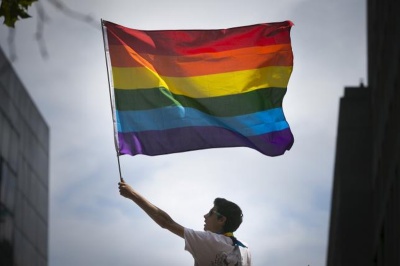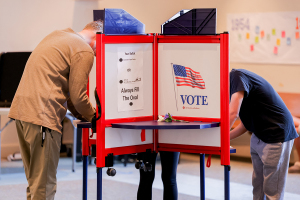Pride messaging down 40% from 2022 as boycotts explode

It was a normal Wednesday commute, crawling across the 14th Street Bridge with thousands of other frustrated D.C. drivers — until out the corner of my eye, I saw the metro glide across the tracks next to us. There, suspended above the Potomac, were eight cars — all wrapped in transgender and rainbow flags — speeding into the most powerful city in the world.
Even now, weeks into this contrived celebration, it was a jarring picture of how insufferable the Pride movement has become. Deep into June, you can’t blame Americans for wondering: When will this train of extremism end?
Like me, Free Republic’s Kristinn Taylor was annoyed to see that even commuters can’t escape the LGBT oversaturation. “DC Metro cars [have] transformed into rolling ‘Pride’ struggle sessions,” she protested on Twitter. And according to a new poll, she’s not alone. Pride fatigue is real, The Trafalgar Group found, and it’s across the board.
In a new survey, Robert Cahaly’s group asked more than 1,000 people (who leaned Democratic by 4%) if they’re sick of the public LGBT pandering. A whopping 62% said yes, they just wished companies would stay neutral. Only 23% think corporations should continue on with their extreme political themes.
Equally as damning — at least for the CEOs still clinging to their offensive activism (think Nike, Target, Kohl’s) — are the massive swaths of consumers who are avoiding leftist brands. While 41% of all voters say they’ve “personally boycotted a company that took a public stance on a cultural or political issue they disagree with,” almost 70% are Republicans, who’ve refused to shop with “progressive” businesses. Forty percent of non-affiliated voters admitted to doing the same.
That’s a sizeable gap in pushback compared to Democrats, who are much less likely (45%) to punish “conservative or MAGA-leaning” businesses. Interestingly, 14% of Joe Biden’s party admitted to joining Republicans in abandoning overly woke companies — a surprisingly high cross-over rate that shows just how much radical CEOs have overplayed their hand on issues like transgenderism.
And the farther we get into June, the more intense the backlash has become. Shoppers everywhere have made punching bags out of Bud Light and Target — forcing several of American brands to reconsider just how much capital they’re willing to sacrifice. As the losses to those brands dip into the multi-billions, there’s a growing sense that businesses are getting the message.
According to Bloomberg, brands are dramatically toning down their Pride promotion from last year. In the wake of the Dylan Mulvaney scandal in April, “references to ‘Pride Month’ in filings, presentations and transcripts from April to June at more than 900 of the largest US companies dropped almost 40% from this time last year, the first decline in five years. Other LGBTQ terms showed similar declines, the analysis found.”
That’s a seismic shift for the U.S. market and an enormous victory for grassroots Americans who’ve finally put their dollars where their values are. As Dr. Ben Carson said on Wednesday’s “Washington Watch,” these big brands have finally been forced to reevaluate their purpose — and, just as importantly, their loyalties. “Corporate America has a very important purpose, and that is to reward their stockholders. Now, they can’t necessarily do that if they have another agenda — like being social manipulators. And I think they’re starting to recognize that. And I’m glad to see also that the people are pushing back.”
The Bud Light disaster, Target’s trans outreach, “all of these things,” Carson pointed out, “are wake-up calls for corporate America to get back to doing what they’re supposed to be doing and stop meddling. You know, one of the reasons that our country was established is because people wanted to come to a place where they could live the life that they wanted to live without it being manipulated and without all kinds of mandates. And whether those mandates come from the government or from corporate America, they still have a deleterious effect on the freedoms that people experience.”
“And the only people who can change that is we the people … We have to put our foot down and say, this is America. This is where we are free to live the way that we want to, to worship the way we want to, to say what we want to say. And we’re not going to stand for government or corporate America to try to dictate [what we think and believe].”
No one has been in that bullseye more than Anheuser-Busch CEO Brendan Whitworth, who called the crashing and burning of his brand a “challenging few weeks” on Fox. And while he has yet to apologize for the firestorm that Bud Light started by embracing transgenderism, he does accept the blame for the devastating consequences of that decision. “We have to understand the impact that it’s had … on our employees, the impact on our consumers, and as well the impact on our partners,” he said. “One thing I’d love to make extremely clear is that impact is my responsibility and as the CEO, everything we do here I’m accountable for.”
“There’s a big social conversation taking place right now,” Whitworth acknowledged, “and big brands are right in the middle of it. And it’s not just our industry or Bud Light. It’s happening in retail, happening in fast food. And so for us, what we need to understand is — deeply understand and appreciate — is the consumer and what they want, what they care about and what they expect from big brands.”
What they expect, the polls have shown since 2021, is neutrality. When a good 40% of your consumer base ups and walks away, there should be plenty of motivation for corporations to sit down and rethink their politics.
“Most Americans respond to relentless, preachy marketing from businesses trying to virtue signal their progressive bona fides like they respond to street preachers thumping a Bible,” Family Research Council’s Joseph Backholm told The Washington Stand. “But the LGBTQ movement, like the street preacher, doesn’t care because they have simply decided anyone who rejects their message is going to hell. The LGBT movement has become what they claim to hate, but they haven’t recognized it yet.”
In the meantime, what they and everyone else can’t help but recognize is Americans' buying power. May it continue to be the bridle that holds the woke in check.
Originally published at The Washington Stand.
Suzanne Bowdey serves as editorial director and senior writer for The Washington Stand. In her role, she drafts commentary on topics such as life, consumer activism, media and entertainment, sexuality, education, religious freedom, and other issues that affect the institutions of marriage and family. Over the past 20 years at FRC, her op-eds have been featured in publications ranging from the Washington Times to The Christian Post. Suzanne is a graduate of Taylor University in Upland, Ind., with majors in both English Writing and Political Science.



























